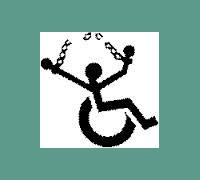by Janine Booth, RMT nominee on TUC Disabled Workers' Committee
Disabled Workers’ Conference decisions
We considered how to best carry out the decisions of the TUC Disabled Workers’ Conference. We agreed that the most effective way to do this was by establishing working groups on various policy areas. Committee members volunteered to convene groups, and a circular will be sent out asking other Committee members to volunteer to join these groups.
I will be convening two groups: Accessible Transport and Anti-Union Laws. Other groups will include: Social Model of Disability; Disability Pay Gap; Social Security; Accessible and Inclusive Education; Reasonable Adjustment; the ‘Gig Economy’.
I have also sent to the TUC proposals for how it implements the emergency resolution on Deaths in Care.
Disabled Workers’ Conference report
We considered the statistics on numbers of delegates, and their breakdown by age, race, etc. There has been little significant change from previous years.
I also raised the issue that delegates had been prevented from distributing materials outside the hall in the conference venue, even though this had been allowed in the past.
Strategic governance
The TUC has been looking at changing the way that its equalities structures work in order to make them more effective. Its report to our meeting contained some useful improvements, for example meetings between the chairs of the various equalities committees to discuss issues that affect several of them eg. the rise of the far right.
The TUC had considered three options for the equalities conferences, which included cutting their frequency and length. The majority of our Committee members argued for the option of keeping the equalities conferences as annual two-day events.
Other issues included: the General Council funding social events at conference; refreshing equalities training; and confirming that the equalities committees have a role in organising events and campaigns as well as advising the General Council and acting as standing orders committees for their conferences.
Mental Health
The TUC’s Matt Dykes gave a presentation on mental health and introduced the new report, Breaking Point: the crisis in mental health funding. The TUC’s campaign has two main themes:
- highlighting the crisis in mental health service provision;
- a more effective approach to promoting good mental health.
The TUC’s work on this developed from its public services work, so is focused on cuts to mental health services and the impact on mental health workers. While this is an important aspect, members of the Committee felt that it was important to address other issues as well, such as workplace distress. We were concerned that the approach was not sufficiently based on the social model of disability.
I questioned what is meant by ‘promoting good mental health’. For many employers, this seems to mean coffee mornings, awareness campaigns and patronising lifestyle advice. As trade unionists, we believe that workers’ mental health will benefit much more from measures such as shorter working hours, secure employment contracts, decent wages, reduced workload, and an end to management bullying.
The TUC is supporting a mental health crisis summit on Saturday 28 September at the Royal Free in London. The Committee had concerns that the list of speakers does not include any elected representatives of disabled people’s organisations or of people with mental health issues, and would like to see this balance redressed.
I also asked that at some point, the Committee discuss the mental health of trade union activists: how our movement can look after people’s well-being and prevent activist burnout.
International solidarity
Mariela Kohon gave a presentation on the TUC’s international work. Priority areas at present are Brazil (where workers and trade unionists are being attacked by the new right-wing government); Columbia (the most dangerous place for trade unionists, with dozens killed each year); Turkey (where the regime suppresses dissent, including from trade unionists); and Palestine (where the Israeli occupation of Palestinian territories causes great difficulties for workers).
We discussed how disability issues can be highlighted in these campaigns. I raised two issues:
- pushing for the international trade union organisations eg. ITUC, ETUC to set up disabled workers’ structures
- active solidarity with disabled trade unionists in Israel/Palestine
- 2009 reads






